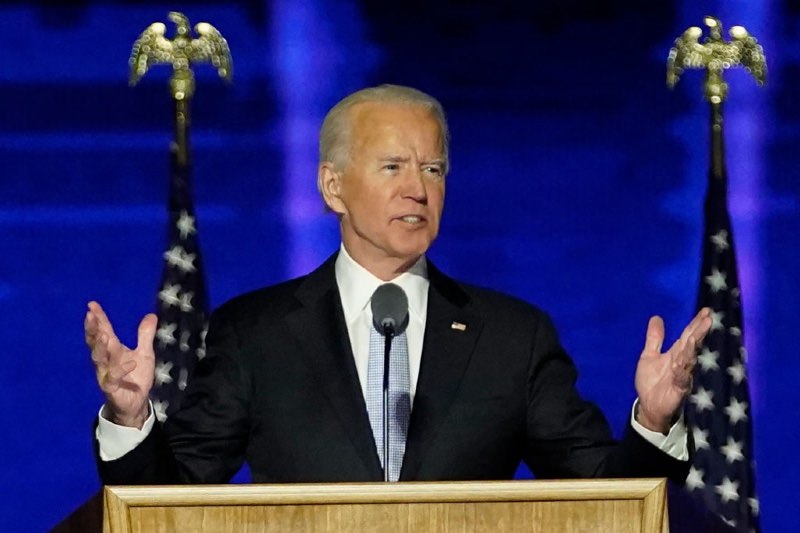Extract from Eureka Street
- Andrew Hamilton
- 19 November 2020
When listening to Mr Biden’s acceptance speech I was reassured by its dignity and inclusiveness. These are surely desirable qualities in what an outsider observer might see as overheated politics. One phrase, however, I found jarring: ‘I sought this office to restore the soul of America. To rebuild the backbone of the nation — the middle class’. The priority given to the middle class was not new — Biden stressed it in speeches through the primaries and again as a candidate. And it is no doubt important. But when seen in the light of the passionate polarisation of the campaign, the closeness of the results and the continuing mutual antipathy of the supporters of each party, rebuilding the middle class seems an unlikely source of healing.

To this outsider, the source of the rage picked up and encouraged by President Trump in his social media and other communications lies less in the pressure endured by the middle class than in the exclusion from social participation of the working and lower classes. This group included people who had lost manufacturing jobs, lived in neighbourhoods characterised by poverty, lack of services and a high rate of addiction, lacked the education and skills necessary in order to find work in the digital era, and so lived without hope for the future. Their caricatures were captured on the photos of his supporters at protests: filled with rage, sometimes with guns and intimidating. They recalled the ‘mob’ so dreaded by earlier political observers in classical Greece and Rome.
These people, and a growing number of white collar workers, including people from minority cultures whose jobs were also threatened by technological change, were united in anger against the articulate and privileged people with a high education who worked in government and media and profited from the changes in society that disenfranchised others. The latter were seen to have no comprehension of the lives endured by people outside the large cities.
If this account is accurate, Biden’s project of rebuilding and restoring the security of the middle class, while admirable, will not touch the roots of alienation in American society. Indeed, it may only exacerbate it by further excluding people thrust into the underclass.
Any adequate policy must do more than deal with the living conditions of people on the margins of society and rescue those who have been newly excluded. It must also dismantle the engine that excludes, isolates people in self-enclosed circles of poverty or wealth, puts people in thrall to debt, and erodes hope of a decent life. This engine is an economic and cultural framework that produces and intensifies gross inequality. In crises within a radically unequal society ordinary people lose their jobs, homes and self-respect while those with wealth build palaces as the stock market rises.
The cultural root of gross inequality is the identification of human happiness with personal wealth, and the exaltation of competitive individuals who become rich by their own efforts. In this culture, with its glorification of the self-made man, the mutual dependence necessary to sustain economic activity and the social bond that attaches to it either fail to be recognised or are considered inimical to the American way of life.
A moment’s thought reveals how unreal is the ideal of the self-made man who single-handedly profits from his freedom. This ideal denies the reliance of all human beings on parents for existence and early survival, and on other people’s cooperation for education, for security, for roads, for communication, for health and for a financial system.
'...the challenge Biden faces is to go into the territory of the people who voted against him and to listen to the stories that underlie the anger and despair felt by so many of them.'
But though unreal, it is a powerful ideal. It fuels opposition to government spending on welfare for people who fail to profit from their freedom, to taxes that take from people what they have earned by their own efforts, to regulations that confine the individual’s freedom to profit, and to any view of society that questions whether all individuals can overcome obstacles to success. This ideal celebrates winners and blames losers for their predicament. It can give hope to people who might otherwise see no hope in their lives, and licenses them to channel their discontent into rage at the losers who usurp their rightful place.
Seen from this perspective President Trump was the true believer in the self-made man and its perfect embodiment. He saw and presented himself as the man who could overcome all obstacles to make profitable deal. He saw the United States, too, as the self-made nation, one that could be made great again by breaking free of the constraints of agreements, alliances, regulations, acknowledgment of limitations, and anything else that constrained its freedom to further its own interests.
In appealing to and acting out this American dream Trump attracted and inspired people of all classes whose experience was of constant loss or fear of loss. They could see him as a vicarious winner. They recognised in him their own anger and were inspired by him as they channelled it into rage at the various privileged groups whom they hated. The louder the voices of his critics who replied to and analysed his twitter lines, the more solid became his support. His one liners expressed what they felt, and the angry and analytical response of his critics only confirmed that they didn’t get it. The exchange confirmed their conviction that he could pull down the house and get away with it.
If this analysis is right, the challenge Biden faces is to go into the territory of the people who voted against him and to listen to the stories that demonstrate the anger and despair felt by so many of them. It will then be to address the gross inequality that underlies these stories, by ensuring that people who live in the lower depths have access to medical services and the opportunity for employment, that will enable them to eat, live and raise families decently.
Such a program is a huge challenge. It will incur vicious opposition from the very wealthy and powerful who profit from an unequal and divided America. But will any less do?
 Andrew Hamilton is consulting editor of Eureka Street, and writer at Jesuit Social Services.
Andrew Hamilton is consulting editor of Eureka Street, and writer at Jesuit Social Services.
No comments:
Post a Comment